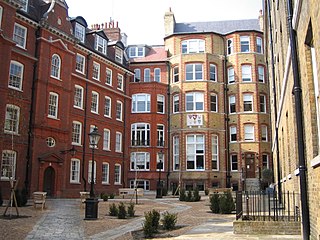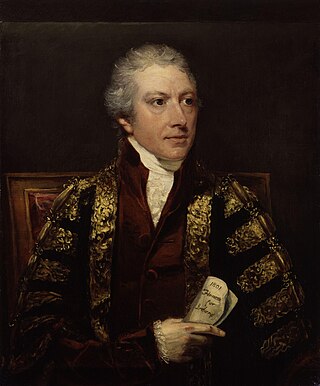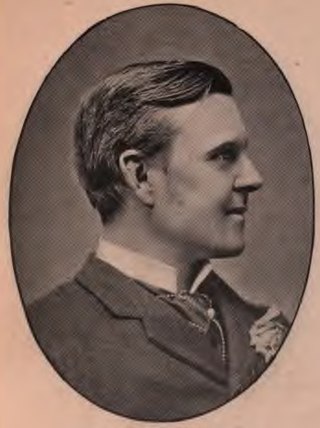Related Research Articles

The Honourable Society of the Inner Temple, commonly known as the Inner Temple, is one of the four Inns of Court and is a professional association for barristers and judges. To be called to the Bar and practise as a barrister in England and Wales, a person must belong to one of these Inns. It is located in the wider Temple area, near the Royal Courts of Justice, and within the City of London. As a liberty, it functions largely as an independent local government authority.

The Inns of Court in London are the professional associations for barristers in England and Wales. There are four Inns of Court: Gray's Inn, Lincoln's Inn, Inner Temple and Middle Temple.

Richard Bethell, 1st Baron Westbury, was a British lawyer, judge and Liberal politician. He served as Lord High Chancellor of Great Britain between 1861 and 1865. He was knighted in 1852 and raised to the peerage in 1861.

Lloyd Kenyon, 1st Baron Kenyon,, was a British politician and barrister, who served as Attorney General, Master of the Rolls and Lord Chief Justice. Born to a country gentleman, he was initially educated in Hanmer before moving to Ruthin School aged 12. Rather than going to university he instead worked as a clerk to an attorney, joining the Middle Temple in 1750 and being called to the Bar in 1756. Initially almost unemployed due to the lack of education and contacts which a university education would have provided, his business increased thanks to his friendships with John Dunning, who, overwhelmed with cases, allowed Kenyon to work many, and Lord Thurlow who secured for him the Chief Justiceship of Chester in 1780. He was returned as the Member of Parliament (MP) for Hindon the same year, serving repeatedly as Attorney General under William Pitt the Younger. He effectively sacrificed his political career in 1784 to challenge the ballot of Charles James Fox, and was rewarded with a baronetcy; from then on he did not speak in the House of Commons, despite remaining an MP.

Charles Abbott, 1st Baron Tenterden, was a British barrister and judge who served as Lord Chief Justice of the King's Bench between 1818 and 1832. Born in obscure circumstances to a barber and his wife in Canterbury, Abbott was educated initially at a dame school before moving to The King's School, Canterbury in 1769. He was noted as an excellent student, receiving an exhibition scholarship from the school in March 1781, when he matriculated at Corpus Christi College, Oxford. Here he was elected a fellow, and also served as a tutor to the son of Sir Francis Buller, which first made him consider becoming a barrister. He joined the Middle Temple in 1787, transferring to the Inner Temple in 1793, and was called to the Bar by the Inner Temple in 1796. Abbott was noted as an excellent barrister, earning more than any other during his time at the Bar, despite being considered unimaginative and a poor speaker. He was offered a position as a Justice of the Court of Common Pleas in 1808, which he turned down; he accepted the same offer in 1816, receiving the customary knighthood and being appointed a Serjeant-at-Law.

Charles Abbot, 1st Baron Colchester PC, FRS was a British barrister and statesman. He served as Speaker of the House of Commons between 1802 and 1817.

Frederic(k) Michael Coleridge Mackarness born at Tardebigge, Saint Bartholomew, Worcestershire, England was a British barrister, judge and Liberal politician and Member of Parliament for the Newbury constituency.

Thomas Chisholm Anstey was an English lawyer and one of the first Catholic parliamentarians in the nineteenth century. He served as Attorney General of Hong Kong for 4 years. He also wrote pamphlets on legal and political topics, particularly those relevant to Roman Catholics.
Sir David Anthony Poole was an English barrister and High Court judge. He is perhaps best known for representing Eric Cantona on charges of a "flying kick" assault of an opposition spectator in 1995.
(James) Michael Coulson was a British barrister and judge, who also had a five-year parliamentary career. He was also an enthusiastic horse rider, huntsman and farmer, and was known at the Bar for his outstanding memory.
Sir Robert Foster (1589–1663) was an English judge and Chief Justice of the King's Bench.
William Digby Seymour (1822–1895) was a British lawyer and poet, and MP for Sunderland and Somerset.
William Campbell Sleigh was an English lawyer and politician. He became a serjeant-at-law in 1868, the last person received into Serjeants' Inn who was not a judge.

John Thomas Graves was an Irish jurist and mathematician. He was a friend of William Rowan Hamilton, and is credited both with inspiring Hamilton to discover the quaternions in October 1843 and then discovering their generalization the octonions himself later that same year. He was the brother of both the mathematician and bishop Charles Graves and the writer and clergyman Robert Perceval Graves.
John Frederick Peel Rawlinson was an English barrister, politician and footballer. An amateur, he won the FA Cup with Old Etonians in 1882 and made one appearance for England in 1882 playing as a goalkeeper, before serving as a Member of Parliament for Cambridge University from 1906 to 1926.

Sir Henry Alfred McCardie was a controversial British judge. Educated at King Edward's School, Birmingham he left school at 16 and spent several years working for an auctioneer before qualifying as a barrister and being called to the Bar in 1894. Despite his lack of a university degree and the business connections that went with it McCardie built up a successful practice in Birmingham and the Midland and Oxford Circuit through a combination of clear arguments, confident advocacy and intense work; he worked so late in his chambers that they became known as "the lighthouse". He moved to London to continue work in 1904 and was a popular barrister, on one day handling twenty-one cases in twenty-one different courts. At the peak of his career, he was earning £20,000 while still a junior barrister; a large amount for that period.

Sir John Lawson Walton KC was a British barrister and Liberal politician.
Peregrine Bingham, the younger (1788–1864) was an English legal writer and journalist.

Pump Court is a courtyard in Temple, London, now primarily housing barristers' chambers. It is the first on the left in Middle Temple Lane from 6 Fleet Street, leading to Inner Temple Lane and Lamb's Buildings. Its name referred to the pump in the middle.

His Honour Sir Thomas Artemus JonesLLD,, was a Welsh barrister, judge, journalist, nationalist and Liberal Party politician who campaigned for the Welsh language.
References
![]() This article incorporates text from a publication now in the public domain : "Foster, Thomas Campbell". Dictionary of National Biography . London: Smith, Elder & Co. 1885–1900.
This article incorporates text from a publication now in the public domain : "Foster, Thomas Campbell". Dictionary of National Biography . London: Smith, Elder & Co. 1885–1900.